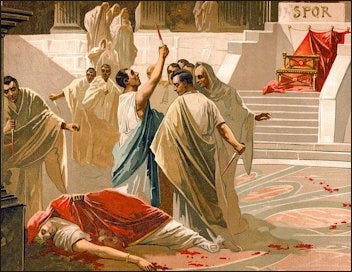The Lost Works of Caesar
I warned people that buying the Caesar book would lead to a bunch of articles on him in a row, but nobody believed me. Look at where we are now.
Long before the Gallic and Civil wars, Julius Caesar was well known in the Roman political world as a great orator. Certain Roman historians considered him to be second only to Cicero,12 and only because Caesar was preoccupied with military campaigns far from the senate and therefore unable to expand his body of works. It is interesting to note, then, that across his entire political career, only two speeches have survived through to the modern era: one preserved by Sallust and the other by Suetonius. Preserving a written record of orations was not altogether a typical practice in the Roman world, but contemporaries attest to a number of comparably important speeches like the Anticato being distributed as leaflets. The question must be asked: how could such works by such a famous man be so carelessly forgotten?
The young Octavian, while seeking to become Augustus Caesar, was more concerned with his public reputation than anything else. One of his first acts in office was to deify his adoptive father Julius so that he could later justify his own eventual deification. In order to ensure that no part of his legacy would ever be questioned, historians are reasonably certain that Augustus had everything that did not reflect well on Julius Caesar destroyed. It should be noted that the previously mentioned surviving orations serve two important purposes for the characterization of the deified Caesar. The first speech was in Sallust’s book3 about the Catilinarian conspiracy,4 which portrays Julius as opposed to the execution of Roman citizens, rather than an active member of Catiline’s traitorous group. The second is an excerpt from Caesar’s funeral oration for his aunt Julia,5 which outlines her (and therefore, his own) familial ties back to Rome’s great leaders and immortal gods. On her mother’s side (gens Marcii) she was descended from Rome’s 4th king Ancus Marcius, and on her father’s side, she was descended from the consul Gaius Julius Iulus, who was, in turn, descended from Ascanius, the grandson of Venus by way of Anchises.6 The former demonstrates his innocence in a suspected crime, and the latter gives legitimacy to his deification. Of course, the theory goes that Augustus only needed the information that would sanction both his and Julius’ ascent to godhood, so everything else could get “misfiled” into a furnace somewhere. As for the war commentaries, they cemented Julius as a military genius and were distributed so far across the republic that they might as well have been uncensorable.
Keep reading with a 7-day free trial
Subscribe to Nusky’s Classics Corner to keep reading this post and get 7 days of free access to the full post archives.




